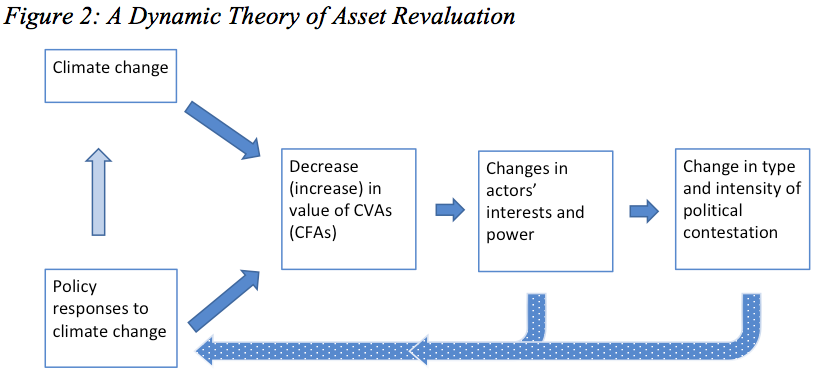My #climate article with @greenprofgreen & @thomasnhale is newly accepted @IntOrgJournal with pre-print posted @SSRN (see link). We argue the increasingly #ExistentialPolitics of climate change threatens the liberal international order. Why? Thread 1/ https://papers.ssrn.com/sol3/papers.cfm?abstract_id=3633498
2/For decades, scholars presented climate change as a collective action problem -> free-riding. Yet, intra-state obstruction by holders of key assets like fossil fuels are as much or more of the obstacle (see also @MichaelAklin @mmildenberger). We suggest a different approach...
3/ We offer a dynamic theory of climate politics based on the present and future revaluation of assets. Political contestation will sharpen between holders of two ideal-type assets: climate-forcing assets like fossil fuels, vs. climate-vulnerable assets like coastal real estate.
4/ Climate change generates #ExistentialPolitics, defined as a nasty subset of distributional politics that involves (a) something at stake of central importance to a given actor and (b) the prospect of its total elimination. E.g. do we want Miami beach or ExxonMobil?
5/ The dynamic competition between climate-forcing and climate-vulnerable asset holders mean that policies adopted in one time period affect the size of assets, and thus political power, of each group in future periods. Early choices matter a lot.
6/Our theory highlights a threat to the liberal order: variation in climate policies across nations will affect manufacturing costs, incentivizing nations to place new restrictions on trade or other economic linkages. Example: EU proposal for carbon border adjustment vs WTO rules
7/While climate is unique, our focus on asset revaluation creates comparisons. For example, as norms and laws changed in the 18th and 19th centuries to prohibit the slave trade, the value of slaves as an asset declined toward zero. Some parallels in the politics. cc @chrislhayes
8/ Our article is part of a 75th Anniversary Special Issue of @IntOrgJournal, led by super-editors Lisa Martin, David Lake, & Thomas Risse, with help from @ErikVoeten & @kfscheve.
9/ We benefited from super feedback from the other authors of the special issue, incl. @henryfarrell @ANewman_forward @jessicacweiss @jerometenk @hgoemans
10/Builds on work by giants like @khar1958 @harrietbulkeley @bernauereth @HoffmannMatt @busbyj2 @thijsvandegraaf @leahstokes @JenniferHadden @GIacobuta @NavrozDubash @SJinnah2 @simonnicholson4 @gabi_spilker @MatPaterson @cullenhendrix @adam_tooze @MichaelWWara @jonasmeckling ++
11/ Grateful for direct input from @KeohaneR @kateaguy @_samr & others. Thank you! cc: @WatsonInstitute @BrownUPoliSci @BrownUResearch @BtGProjectDC @payneinstitute @sais_isep /fin

 Read on Twitter
Read on Twitter


